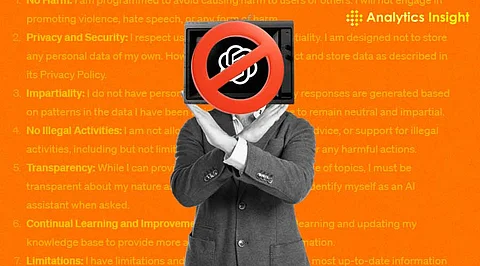

Artificial intelligence has brought a revolution into various sectors as tasks have now become more efficient and automated. One of the popular AI tools is ChatGPT, which has been broadly adopted in the workplace for creating content, doing research, and providing customer services.
However, recent security issues and data privacy concerns have been forcing governments across the world to ban the usage of ChatGPT. It is these changes that began the heated debates of whether AI imperils sensitive information and the nation's security mechanisms.
Governments handle sensitive material; this contains classified information, personal records and national security issues. AI-driven tools like chat GPT tend to use voluminous data sets in order to produce the end result, bringing about issues concerned with data security. The reasons behind banning these in government offices are as follows:
AI chatbots store huge amounts of user data. When government officials are using the chatbot to input confidential or classified information, it is probable that the information is stored somewhere, and that unauthorized persons can access such data. Though OpenAI has policies against the storage of sensitive data, this is a reason why there may be a high likelihood of an unintentional leak.
AI models generate responses based on pre-trained data. There is no guarantee that the information provided by ChatGPT will always be accurate or appropriate for government use. Inaccurate responses could lead to misinformation, affecting decision-making processes in critical government functions.
AI tools are vulnerable to cyberattacks. Such attacks can be perpetrated through using AI-generated content for misinformation or commandeered official communication by hackers, thereby leveraging it for their benefit or unauthorized systems internally. Cybersecurity experts argue that AI can be used to create very convincing phishing attacks on governmental networks.
Most countries have strict laws related to sensitive information and improper handling of the same might bring legal and ethical considerations about AI tools. Most governments would prefer using the in-house developed software with severe security protocols than third-party AI software with no known data handling policies.
Several countries have acted to limit or ban the application of ChatGPT and AI tools within government offices.
Italy banned ChatGPT in 2023 for privacy concerns. The ban was lifted after the changes OpenAI made in service to accommodate its changes for data protection laws.
France and Germany are concerned regarding the national security posed by AI technology and consequently are considering strong legislation.
The United States has cut down the usage of AI tools in government offices, particularly those dealing with classified information.
China has already taken stringent measures against AI, as all AI-related content must support the policies set by the government.
These developments suggest that AI is becoming an issue in government operations and possibly threatening national security.
Although AI tools like ChatGPT can be very helpful in automating and making things easy, they also threaten the security level. Governments are now taking alternative strategies to safely incorporate AI in their official work without compromising data privacy. Some of the possible approaches are:
By not depending on third-party AI tools, governments can create their own AI models with security. Such models should be used to fulfil compliance demands and ensure that data is not shared or disclosed to third parties.
There should be regulations by the government that govern the use of AI in public offices. Governments can create regulations on how to responsibly approach data security, compliance, and AI usage to minimize risks.
Further, strengthen the infrastructure of cybersecurity to be able to defeat the threats posed by AI. Train employees on the government level on how to identify AI-generated security risks and be on stern terms with the data protection protocol.
The ban on ChatGPT in government offices has brought to the fore the security risks associated with AI. Despite the evolution of AI technology, data privacy, cybersecurity threats, and misinformation remain significant challenges.
This would require the governments to weigh the benefits of exploiting AI against the need to protect national security and sensitive information. The future of AI in government work will be shaped by the development of secure, transparent, and well-regulated AI systems that are in line with legal and ethical standards.
